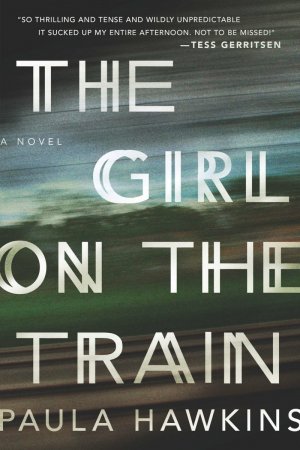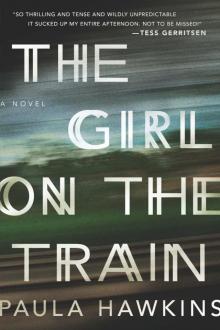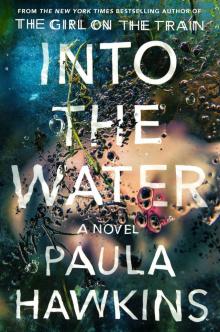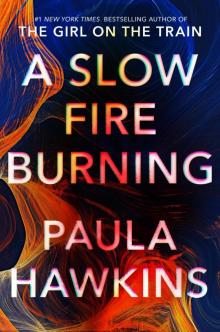- Home
- Paula Hawkins
The Girl on the Train Page 4
The Girl on the Train Read online
Page 4
EVENING
There’s been a problem on the line. The 5:56 fast train to Stoke has been cancelled, so its passengers have invaded my train and it’s standing room only in the carriage. I, fortunately, have a seat, but by the aisle, not next to the window, and there are bodies pressed against my shoulder, my knee, invading my space. I have an urge to push back, to get up and shove. The heat has been building all day, closing in on me, I feel as though I’m breathing through a mask. Every single window has been opened and yet, even while we’re moving, the carriage feels airless, a locked metal box. I cannot get enough oxygen into my lungs. I feel sick. I can’t stop replaying the scene in the coffee shop this morning, I can’t stop feeling as though I’m still there, I can’t stop seeing the looks on their faces.
I blame Jess. I was obsessing this morning about Jess and Jason, about what she’d done and how he would feel, about the confrontation they would have when he found out and when his world, like mine, was ripped apart. I was walking around in a daze, not concentrating on where I was going. Without thinking, I went into the coffee shop that everyone from Huntingdon Whitely uses. I was through the door before I saw them, and by the time I did it was too late to turn back; they were looking at me, eyes widening for a fraction of a second before they remembered to fix smiles on their faces. Martin Miles with Sasha and Harriet, a triumvirate of awkwardness, beckoning, waving me over.
“Rachel!” Martin said, arms outstretched, pulling me into a hug. I wasn’t expecting it, my hands were caught between us, fumbling against his body. Sasha and Harriet smiled, gave me tentative air-kisses, trying not to get too close. “What are you doing here?”
For a long, long moment, I went blank. I looked at the floor, I could feel myself colouring and, realizing it was making it worse, I gave a false laugh and said, “Interview. Interview.”
“Oh.” Martin failed to hide his surprise, while Sasha and Harriet nodded and smiled. “Who’s that with?”
I couldn’t remember the name of a single public relations firm. Not one. I couldn’t think of a property company, either, let alone one that might realistically be hiring. I just stood there, rubbing my lower lip with my forefinger, shaking my head, and eventually Martin said, “Top secret, is it? Some firms are weird like that, aren’t they? Don’t want you saying anything until the contracts are signed and it’s all official.” It was bullshit and he knew it, he did it to save me and nobody bought it, but everyone pretended they did and nodded along. Harriet and Sasha were looking over my shoulder at the door, they were embarrassed for me, they wanted a way out.
“I’d better go and order my coffee,” I said. “Don’t want to be late.”
Martin put his hand on my forearm and said, “It’s great to see you, Rachel.” His pity was almost palpable. I’d never realized, not until the last year or two of my life, how shaming it is to be pitied.
The plan had been to go to Holborn Library on Theobalds Road, but I couldn’t face it, so I went to Regent’s Park instead. I walked to the very far end, next to the zoo. I sat down in the shade beneath a sycamore tree, thinking of the unfilled hours ahead, replaying the conversation in the coffee shop, remembering the look on Martin’s face when he said good-bye to me.
I must have been there for less than half an hour when my mobile rang. It was Tom again, calling from the home phone. I tried to picture him, working at his laptop in our sunny kitchen, but the image was spoilt by encroachments from his new life. She would be there somewhere, in the background, making tea or feeding the little girl, her shadow falling over him. I let the call go to voice mail. I put the phone back into my bag and tried to ignore it. I didn’t want to hear any more, not today; today was already awful enough and it was not yet ten thirty in the morning. I held out for about three minutes before I retrieved the phone and dialled into voice mail. I braced myself for the agony of hearing his voice—the voice that used to speak to me with laughter and light and now is used only to admonish or console or pity—but it wasn’t him.
“Rachel, it’s Anna.” I hung up.
I couldn’t breathe and I couldn’t stop my brain from racing or my skin from itching, so I got to my feet and walked to the corner shop on Titchfield Street and bought four gin and tonics in cans, then went back to my spot in the park. I opened the first one and drank it as fast as I could, and then opened the second. I turned my back to the path so that I couldn’t see the runners and the mothers with buggies and the tourists, and if I couldn’t see them, I could pretend like a child that they couldn’t see me. I called my voice mail again.
“Rachel, it’s Anna.” Long pause. “I need to talk to you about the phone calls.” Another long pause—she’s talking to me and doing something else, multitasking, the way busy wives and mothers do, tidying up, loading the washing machine. “Look, I know you’re having a tough time,” she says, as though she has nothing to do with my pain, “but you can’t call us at night all the time.” Her tone is clipped, irritable. “It’s bad enough that you wake us when you call, but you wake Evie, too, and that’s just not acceptable. We’re struggling to get her to sleep through at the moment.” We’re struggling to get her to sleep through. We. Us. Our little family. With our problems and our routines. Fucking bitch. She’s a cuckoo, laying her egg in my nest. She has taken everything from me. She has taken everything and now she calls me to tell me that my distress is inconvenient for her?
I finish the second can and make a start on the third. The blissful rush of alcohol hitting my bloodstream lasts only a few minutes, and then I feel sick. I’m going too fast, even for me, I need to slow down; if I don’t slow down something bad is going to happen. I’m going to do something I will regret. I’m going to call her back, I’m going to tell her I don’t care about her and I don’t care about her family and I don’t care if her child never gets a good night’s sleep for the rest of its life. I’m going to tell her that the line he used with her—don’t expect me to be sane—he used it with me, too, when we were first together; he wrote it in a letter to me, declaring his undying passion. It’s not even his line: he stole it from Henry Miller. Everything she has is secondhand. I want to know how that makes her feel. I want to call her back and ask her, What does it feel like, Anna, to live in my house, surrounded by the furniture I bought, to sleep in the bed that I shared with him for years, to feed your child at the kitchen table he fucked me on?
I still find it extraordinary that they chose to stay there, in that house, in my house. I couldn’t believe it when he told me. I loved that house. I was the one who insisted we buy it, despite its location. I liked being down there on the tracks, I liked watching the trains go by, I enjoyed the sound of them, not the scream of an inner-city express but the old-fashioned trundling of ancient rolling stock. Tom told me, “It won’t always be like this, they’ll eventually upgrade the line and then it will be fast trains screaming past,” but I couldn’t believe it would ever actually happen. I would have stayed there, I would have bought him out if I’d had the money. I didn’t, though, and we couldn’t find a buyer at a decent price when we divorced, so instead he said he’d buy me out and stay on until he got the right price for it. But he never found the right buyer, instead he moved her in, and she loved the house like I did, and they decided to stay. She must be very secure in herself, I suppose, in them, for it not to bother her, to walk where another woman has walked before. She obviously doesn’t think of me as a threat. I think about Ted Hughes, moving Assia Wevill into the home he’d shared with Plath, of her wearing Sylvia’s clothes, brushing her hair with the same brush. I want to ring Anna up and remind her that Assia ended up with her head in the oven, just like Sylvia did.
I must have fallen asleep, the gin and the hot sun lulling me. I woke with a start, scrabbling around desperately for my handbag. It was still there. My skin was prickling, I was alive with ants, they were in my hair and on my neck and chest and I leaped to my feet, clawing them away. Two teenage boys, kick
ing a football back and forth twenty yards away, stopped to watch, bent double with laughter.
The train stops. We are almost opposite Jess and Jason’s house, but I can’t see across the carriage and the tracks, there are too many people in the way. I wonder whether they are there, whether he knows, whether he’s left, or whether he’s still living a life he’s yet to discover is a lie.
SATURDAY, JULY 13, 2013
MORNING
I know without looking at a clock that it is somewhere between seven forty-five and eight fifteen. I know from the quality of the light, from the sounds of the street outside my window, from the sound of Cathy vacuuming the hallway right outside my room. Cathy gets up early to clean the house every Saturday, no matter what. It could be her birthday, it could be the morning of the Rapture—Cathy will get up early on Saturday to clean. She says it’s cathartic, it sets her up for a good weekend, and because she cleans the house aerobically, it means she doesn’t have to go to the gym.
It doesn’t really bother me, this early-morning vacuuming, because I wouldn’t be asleep anyway. I cannot sleep in the mornings; I cannot snooze peacefully until midday. I wake abruptly, my breath jagged and heart racing, my mouth stale, and I know immediately that’s it. I’m awake. The more I want to be oblivious, the less I can be. Life and light will not let me be. I lie there, listening to the sound of Cathy’s urgent, cheerful busyness, and I think about the clothes on the side of the railway line and about Jess kissing her lover in the morning sunshine.
The day stretches out in front of me, not a minute of it filled.
I could go to the farmer’s market on the Broad; I could buy venison and pancetta and spend the day cooking.
I could sit on the sofa with a cup of tea and Saturday Kitchen on TV.
I could go to the gym.
I could rewrite my CV.
I could wait for Cathy to leave the house, go to the off-licence and buy two bottles of sauvignon blanc.
In another life, I woke early, too, the sound of the 8:04 rumbling past; I opened my eyes and listened to the rain against the window. I felt him behind me, sleepy, warm, hard. Afterwards, he went to get the papers and I made scrambled eggs, we sat in the kitchen drinking tea, we went to the pub for a late lunch, we fell asleep, tangled up together in front of the TV. I imagine it’s different for him now, no lazy Saturday sex or scrambled eggs, instead a different sort of joy, a little girl tucked up between him and his wife, babbling away. She’ll be just learning to talk now, all “Dada” and “Mama” and a secret language incomprehensible to anyone but a parent.
The pain is solid and heavy, it sits in the middle of my chest. I cannot wait for Cathy to leave the house.
EVENING
I am going to see Jason.
I spent all day in my bedroom, waiting for Cathy to go out so that I could have a drink. She didn’t. She sat steadfast and unmovable in the living room, “just catching up on a bit of admin.” By late afternoon I couldn’t stand the confinement or the boredom any longer, so I told her I was going out for a walk. I went to the Wheatsheaf, the big, anonymous pub just off High Street, and I drank three large glasses of wine. I had two shots of Jack Daniel’s. Then I walked to the station, bought a couple of cans of gin and tonic and got onto the train.
I am going to see Jason.
I’m not going to visit him, I’m not going to turn up at his house and knock on the door. Nothing like that. Nothing crazy. I just want to go past the house, roll by on the train. I’ve nothing else to do, and I don’t feel like going home. I just want to see him. I want to see them.
This isn’t a good idea. I know it’s not a good idea.
But what harm can it do?
I’ll go to Euston, I’ll turn around, I’ll come back. (I like trains, and what’s wrong with that? Trains are wonderful.)
Before, when I was still myself, I used to dream of taking romantic train journeys with Tom. (The Bergen Line for our fifth anniversary, the Blue Train for his fortieth.)
Hang on, we’re going to pass them now.
The light is bright, but I can’t see all that well. (Vision doubling. Close one eye. Better.)
There they are! Is that him? They’re standing on the terrace. Aren’t they? Is that Jason? Is that Jess?
I want to be closer, I can’t see. I want to be closer to them.
I’m not going to Euston. I’m going to get off at Witney. (I shouldn’t get off at Witney, it’s too dangerous, what if Tom or Anna sees me?)
I’m going to get off at Witney.
This is not a good idea.
This is a very bad idea.
There’s a man on the opposite side of the train, sandy blond hair veering towards ginger. He’s smiling at me. I want to say something to him, but the words keep evaporating, vanishing off my tongue before I have the chance to say them. I can taste them, but I can’t tell if they are sweet or sour.
Is he smiling at me, or is he sneering? I can’t tell.
SUNDAY, JULY 14, 2013
MORNING
My heartbeat feels as though it is in the base of my throat, uncomfortable and loud. My mouth is dry, it hurts to swallow. I roll onto my side, my face turned to the window. The curtains are drawn, but what light there is hurts my eyes. I bring my hand up to my face; I press my fingers against my eyelids, trying to rub away the ache. My fingernails are filthy.
Something is wrong. For a second, I feel as though I’m falling, as though the bed has disappeared from beneath my body. Last night. Something happened. The breath comes sharply into my lungs and I sit up, too quickly, heart racing, head throbbing.
I wait for the memory to come. Sometimes it takes a while. Sometimes it’s there in front of my eyes in seconds. Sometimes it doesn’t come at all.
Something happened, something bad. There was an argument. Voices were raised. Fists? I don’t know, I don’t remember. I went to the pub, I got onto the train, I was at the station, I was on the street. Blenheim Road. I went to Blenheim Road.
It comes over me like a wave: black dread.
Something happened, I know it did. I can’t picture it, but I can feel it. The inside of my mouth hurts, as though I’ve bitten my cheek, there’s a metallic tang of blood on my tongue. I feel nauseated, dizzy. I run my hands through my hair, over my scalp. I flinch. There’s a lump, painful and tender, on the right side of my head. My hair is matted with blood.
I stumbled, that’s it. On the stairs at Witney station. Did I hit my head? I remember being on the train, but after that there is a gulf of blackness, a void. I’m breathing deeply, trying to slow my heart rate, to quell the panic rising in my chest. Think. What did I do? I went to the pub, I got on the train. There was a man there—I remember now, reddish hair. He smiled at me. I think he talked to me, but I can’t remember what he said. There’s something more to him, more to the memory of him, but I can’t reach it, can’t find it in the black.
I’m frightened, but I’m not sure what I’m afraid of, which just exacerbates the fear. I don’t even know whether there’s anything to be frightened of. I look around the room. My phone is not on the bedside table. My handbag is not on the floor, it’s not hanging over the back of the chair where I usually leave it. I must have had it, though, because I’m in the house, which means I have my keys.
I get out of bed. I’m naked. I catch sight of myself in the full-length mirror on the wardrobe. My hands are trembling. Mascara is smeared over my cheekbones, and I have a cut on my lower lip. There are bruises on my legs. I feel sick. I sit back down on the bed and put my head between my knees, waiting for the wave of nausea to pass. I get to my feet, grab my dressing gown and open the bedroom door just a crack. The flat is quiet. For some reason I am certain Cathy isn’t here. Did she tell me that she was staying at Damien’s? I feel as though she did, though I can’t remember when. Before I went out? Or did I speak to her later? I walk as quietly as I can out i
nto the hallway. I can see that Cathy’s bedroom door is open. I peer into her room. Her bed is made. It’s possible she has already got up and made it, but I don’t think she stayed here last night, which is a source of some relief. If she isn’t here, she didn’t see or hear me come in last night, which means that she doesn’t know how bad I was. This shouldn’t matter, but it does: the sense of shame I feel about an incident is proportionate not just to the gravity of the situation, but also to the number of people who witnessed it.
At the top of the stairs I feel dizzy again and grip the banister tightly. It is one of my great fears (along with bleeding into my belly when my liver finally packs up) that I will fall down the stairs and break my neck. Thinking about this makes me feel ill again. I want to lie down, but I need to find my bag, check my phone. I at least need to know that I haven’t lost my credit cards, I need to know who I called and when. My handbag has been dumped in the hallway, just inside the front door. My jeans and underwear sit next to it in a crumpled pile; I can smell the urine from the bottom of the stairs. I grab my bag to look for my phone—it’s in there, thank God, along with a bunch of scrunched-up twenties and a bloodstained Kleenex. The nausea comes over me again, stronger this time; I can taste the bile in the back of my throat and I run, but I don’t make it to the bathroom, I vomit on the carpet halfway up the stairs.
I have to lie down. If I don’t lie down, I’m going to pass out, I’m going to fall. I’ll clean up later.
Upstairs, I plug in my phone and lie down on the bed. I raise my limbs, gently, gingerly, to inspect them. There are bruises on my legs, above the knees, standard drink-related stuff, the sort of bruises you get from walking into things. My upper arms bear more worrying marks, dark, oval impressions that look like fingerprints. This is not necessarily sinister, I have had them before, usually from when I’ve fallen and someone has helped me up. The crack on my head feels bad, but it could be from something as innocuous as getting into a car. I might have taken a taxi home.

 Girl on the Train
Girl on the Train The Girl on the Train
The Girl on the Train Into the Water
Into the Water A Slow Fire Burning
A Slow Fire Burning